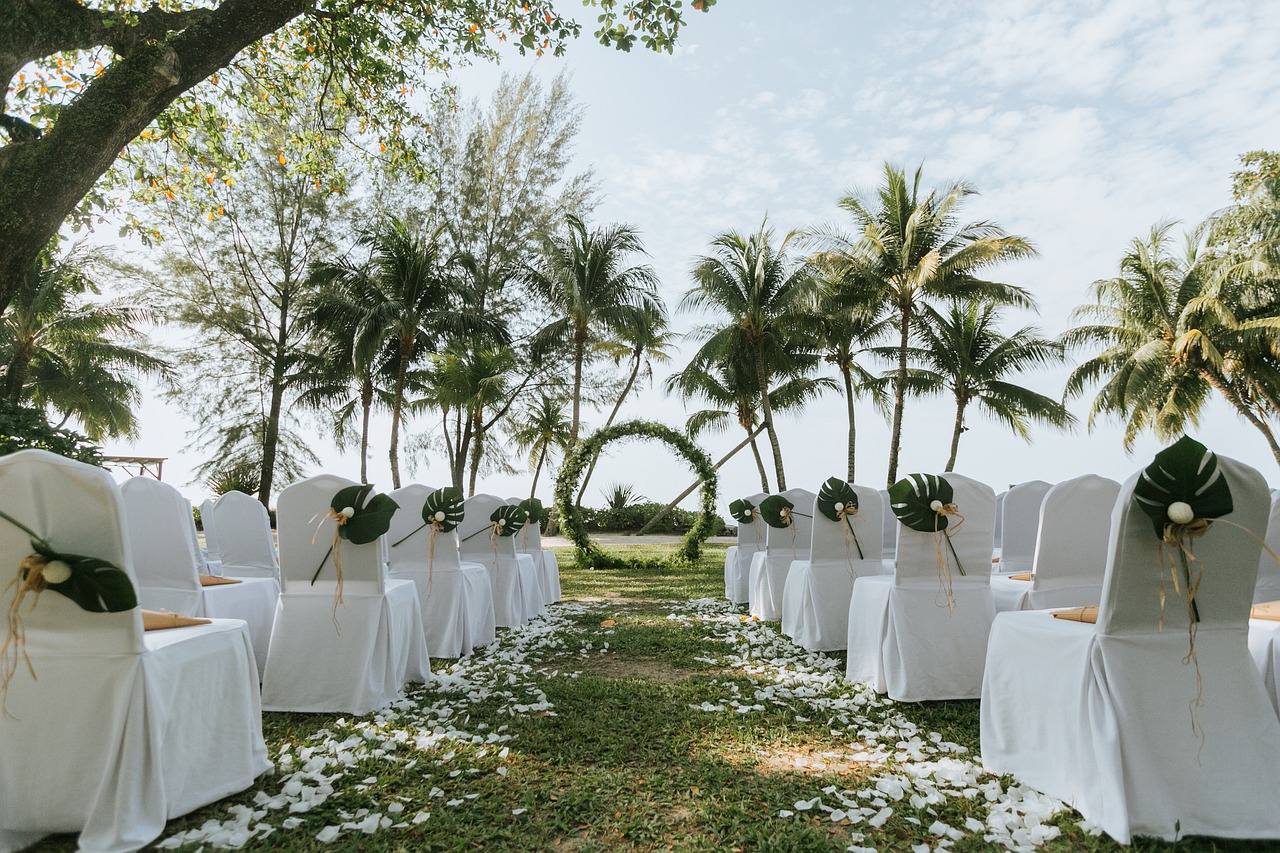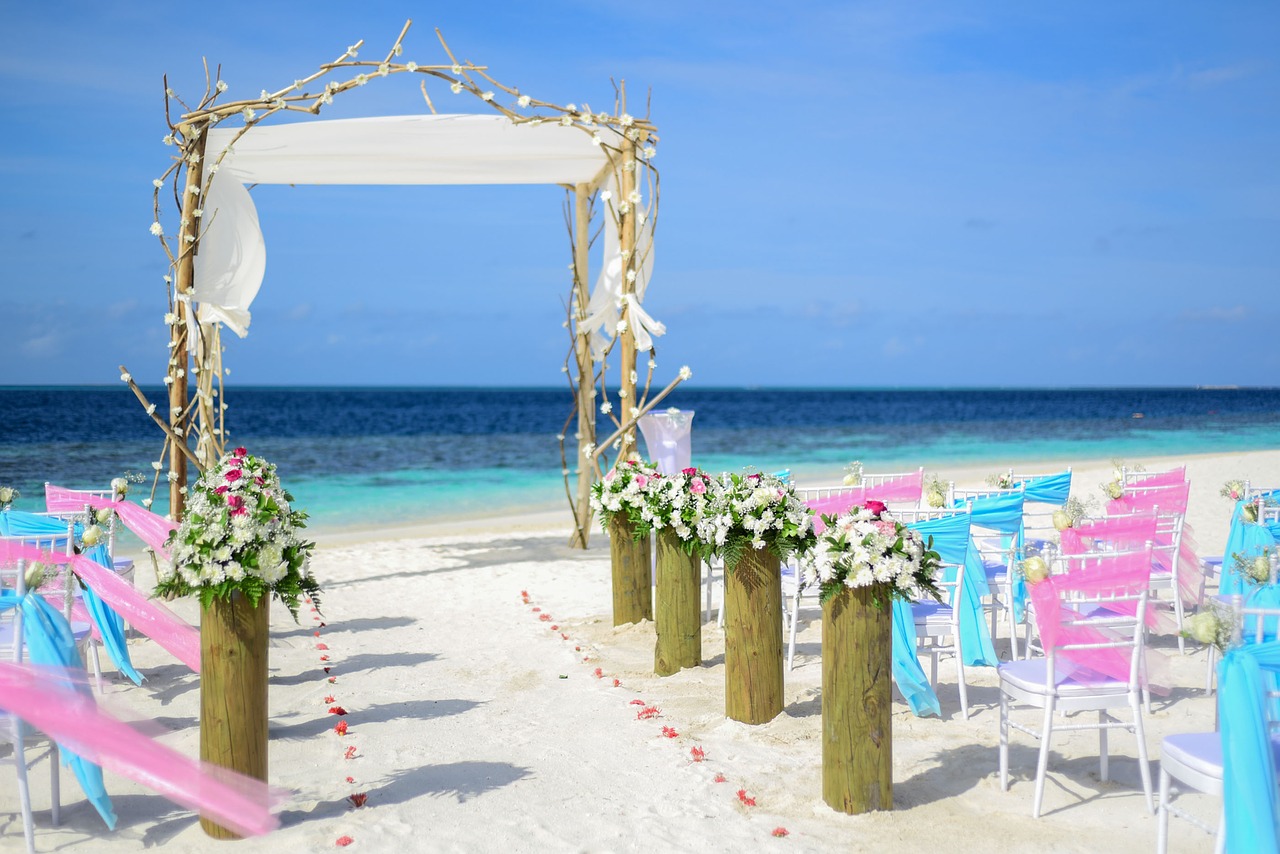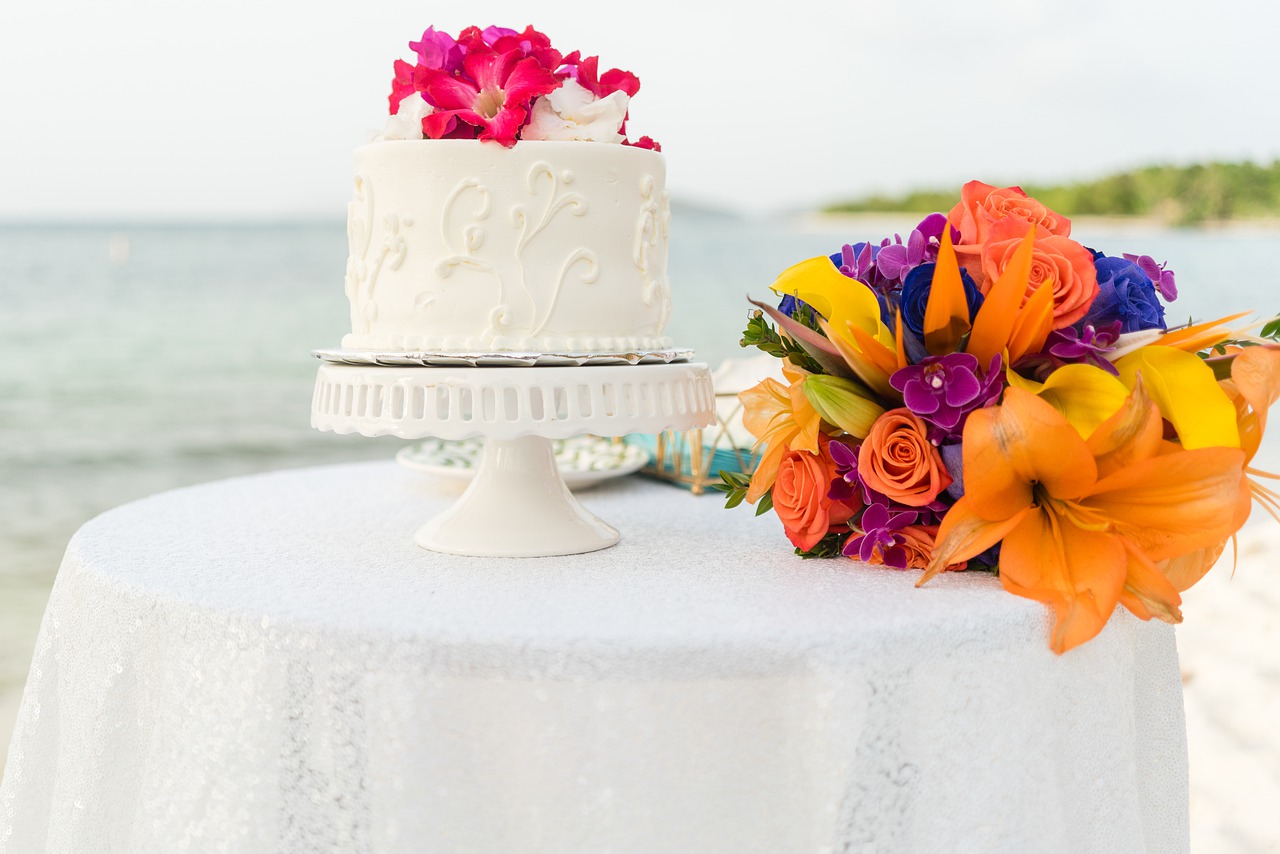
What Information Ought to Be Presented on the Invitation?
When inviting people from out of town to your destination wedding, you'll need to provide them with a lot more details than you would for a local ceremony.
If you want your guests to know how long they should plan to stay in town, it's a good idea to include an information card in addition to their official invitation.
The weekend plan has to detail when and where everything will take place. You should also have a card printed with information on where people may stay, whether that be in a large house set aside for the group or at nearby hotels with room blocks (and advice on how to get discounts!).
For large weddings or other events where many people will need to coordinate their efforts, creating a website is a fantastic idea. Include information on local transit and things to do in the area all in one convenient location.
Don't Cram Your Guests' Schedules.
In order to give guests enough time to respond to invitations and save the date cards, send the former out between eight and ten months before the wedding and the latter out three months before.
Give your guests plenty of notice if you expect them to fly in for your wedding or provide passports for entry.
Sending out save-the-dates for a destination wedding should be done at least six months in advance, as opposed to the four months recommended for a local ceremony. Additionally, you should have all the travel information detailed on your wedding invitation before sending out invitations at the 12-week mark.
Send out your save-the-dates eight to twelve months before the big day! The official invitations should be sent out at least three to four months in advance. Guests will have more time to make preparations with a lengthy notice, but domestic locations can be more flexible.
We Must Arrange Travel For Guests?
It is not required that you arrange travel arrangements for others, but doing so is a kind gesture. A travel agency may make things easier by handling group reservations, collecting and entering all of the travellers' information, and finding the most cost-effective options.
They might even get special treatment and even an upgrade. Create a group on social media or a group chat to coordinate group trips and share information on cheap airfare. Guests will be kept on time and informed with the help of a wedding itinerary.
Give Your Visitors a Warm Reception.
Make your guests feel at home right away. Perhaps you might celebrate the arrival with a party. Sunscreen, flip-flops, and other items useful in hot climates can be included in welcome bags.
Facilitate their enjoyment,"
As the bride-to-be, it is your responsibility to ensure that all of your guests have everything they need to enjoy the wedding weekend, including a detailed travel schedule, accurate weather forecast, and helpful dress ideas.
How Should You Safely Transport Our Wedding Gown?
This could be one of the most challenging aspects of organising a wedding at a faraway location. Carrying it in a garment bag as carry-on luggage is the most convenient alternative .
If the plane has a wardrobe, you can hang your dress there; otherwise, wait until all of the rolling luggage have been stowed before laying your dress on top of the suitcases. If the cloth doesn't wrinkle easily, you could also pack it in your own carry-on.
Get Some Time to Yourself After The Ceremony if You Need it.
It's impossible to bring this up in conversation. You can stay somewhere quiet after the reception if you and your new spouse want some alone time.
Stay in your hotel room for the night. Do not disturb sign should be up. Rent a bridal room at a different hotel. They will understand what you mean.
Become Familiar With The Customs of The Area
To avoid offending the culture of the country in which your wedding will take place, "do not include rituals or traditions or other characteristics,"
Tipping your suppliers, for example, can be seen as rude in some cultures.
The guests at the wedding reception tipped the bartenders to show their appreciation for their hard work, but the bartenders took offence and lodged a formal complaint with the banquet captain, who in turn lodged a formal complaint with the bride and groom.
Consult a local wedding planner for information on the specific customs or traditions of your wedding's location to ensure proper cultural sensitivity and etiquette. For instance, if you learn that guests are expected to tip, please advise them that this is considered impolite.
Inform Your Guests of Important Details.
It's important to provide your guests with as much information as possible as early as possible, as there are a lot of moving parts to a destination wedding.
The website you create for your wedding is the best location to post details like the itinerary for the weekend, directions, contact information in case of an emergency, and anything else that guests will need to know.

Promote Social Interaction by Setting up Mingling Opportunities.
It could be nice to allow guests to bring a plus one if they won't know anybody else at the wedding. Because many destination weddings last for a full week, it's a good idea to have a welcome party and arrange additional group activities, including tours, sports, and boat cruises, so that your guests can get to know one another.
Assure that everyone is having a wonderful time and has friends to hang out with.
Can We Still Have a Registry if The Wedding is Out of Town?
You may wish to forego wedding gifts in light of the rising cost of inviting people. Tell guests that their attendance is more valuable than any present on the invites or the wedding website.
If you want to use a registry, have gifts sent to your house instead of the wedding hall, or accept only digital gifts such as gift cards or money sent to a honeymoon fund. Some hotels even offer honeymoon registries specifically for the activities available at the property.
Visitor Information
Never Bring Someone in Without Being Asked to.
When invited without a plus one, it is considered quite rude to bring a buddy to the destination wedding. You will have to embrace the fact that you will be completely alone during the wedding if you decide to go it alone. It's not fair to contribute to your friend's or partner's expenses by inviting them yourself.
It's Not Necessary to go Into Debt Buying a Present.
If you spend a lot of money on transportation to the wedding, a small token of your appreciation is all that's required. Of course, the final decision rests with you. Either rank high in the registry, or rank low. Instead of lugging your gift onto a plane, have it shipped directly to the happy couple in advance of the wedding.
Locations for Overnight Stays
It is customary to have guests pay for their own housing and transportation, but you should still make this explicit in a polite manner. Set the tone for the stay by suggesting hotels or booking services and outlining your needs and preferences diplomatically.
In the event that you have reserved a block of hotel rooms, remind your guests that they are responsible for making their own reservations. The best ways to spread the word, though, will be through your wedding website and save-the-dates.
In other words, you need not cover anyone in your wedding party's travel budget. Consequently, you should make an effort to establish as many connections as possible between them.
Provide affordable lodging choices, or think about hiring a home instead of individual rooms so that everyone may sleep in the same place . Tell them as soon as possible so they can start looking for cheap plane tickets as well.
Do We Have to Foot The Bill For Whatever Meals Our Guests Have Besides The Reception?
The only meals that guests are expected to pay for are those served during the ceremonies themselves (rehearsal dinner, wedding day meals for the wedding party, reception dinner, and morning-after brunch). However, if you're asking guests to join you for more than three days, it's a nice gesture to pick up the tab at least once more, such as at a welcome dinner or lunch on the beach.
If you're able to do so, it would be greatly appreciated if you could cover the cost of the wedding party's breakfast each day.
Advice for Arranging a Destination Wedding
Pick a Place, Any Place.
It's important to choose a location that's secure and has everything you'll need. You can't have your wedding in the quaint beach community where you spent your earliest years if there's just one hotel and no way to meet your guests' needs for accessibility or childcare.
Also, be sure that your guests won't feel uncomfortable because of their religion, gender, or sexual orientation, and that there have been any recent travel advisories, political difficulties, or health concerns in the area. Consider if your oldest or least travelled guest would be able to make the journey. A combination of air, rail, and road travel may not be feasible for your pregnant sister-in-law or your elderly grandparents.
Think About a Place to Stay For Visitors.
Although social protocol does not compel you to pay for lodging, it is a nice gesture to provide several options that should be affordable for any guest.
It's preferable to provide a range of prices for customers to choose from. Just make sure the hotels you recommend are within a maximum 15-minute drive. Consolidating a large group of people into a smaller geographical area can be done more cheaply and efficiently by arranging a room block in advance. Wait to set the date until you know for sure that everyone can attend.
Shop at Home And Save Big
To save money, using regional flowers (like olive branches in Tuscany or tropical flowers in the tropics) and foods as centrepieces and appetisers.
Like that, you'll feel like you're really there in the setting that first captivated you. However, since you are spending a lot of money on this vacation spot, you should take full advantage of all it has to offer.

Consider Working With a Seasoned Expert.
Discover a wedding planner or organiser who has experience with destination weddings. By having an expert take care of everything, you won't have to waste time figuring out how to communicate across a communication barriers or making important decisions from afar.
If hiring a planner is out of your price range, find a hotel with a competent coordinator on site.
Pre-Trip Inspection
You should visit the wedding venue once before hiring it, and then again a few months before the big day to iron out any last-minute details.
If you can't make it back for a second trip, get there five days early to make your choices and try out your hair and cosmetics.
Hold Business Meetings with Suppliers
When planning your first trip to a destination, it's important to set up meetings with the best rental and florist companies in the area. If you ask around at your venue, you can find some hidden gems in the local entertainment scene and save money in the process.
You should plan on paying for the professionals' transportation and lodging if you bring them in from out of town. Find a nice, secure hotel that's less than a half-hour drive from the action. Expenses like these should be negotiated in advance to avoid any unanticipated surprises.
Conceive of More Gatherings to Host
Add more events throughout the day to make the party last longer. The guests won't feel like they wasted their time thanks to some supplementary activities. It is not necessary to host a reception for guests to meet the newlyweds, but it is a tradition that many couples choose to observe.
One enjoyable way for some married couples to learn about the local culture is by organising group tours. Celebration of the wedding weekend's conclusion and farewells can be done with a lovely brunch or lunch.
Make Sure You Have Wedding Insurance
When organising a wedding in a foreign country, it's best to prepare for the unexpected. Several wedding locations insist on it, and buying insurance for your big day is a smart financial and mental health move regardless.
It's best to sign up ahead of time, though some companies can work with a tight deadline, and to have a firm grasp on the types of policies you can purchase and the extent of their coverage.
Plan For The Unforeseen
It's a common myth that destination weddings are more expensive than traditional ones, but in reality, this is rarely the case. Airport transfers, extra luggage, shipping costs, and tips for service providers you don't interact with directly should all be factored into your overall travel budget.
A welcome party and breakfast the following day will also significantly increase costs. Informing your credit card company of your upcoming travel plans will prevent you from incurring any unwanted fees or having your card declined.
You'll want to be prepared, so bring some cash.
Be Sure To Research The Legal Prerequisites For Getting Married in Your Area.
The process of making a marriage legal requires more than just finding an officiant. Depending on the destination country, you may need a wide variety of documents, such as a birth certificate, a medical certificate, a letter of intent, and proof of domicile.
Gaining knowledge early will give you time to prepare for the challenge at hand.
Passports and Travel Documents
Traveling abroad requires a passport, but domestic travel only necessitates a driver's licence. When you have settled on a location and wedding date, it is time to double-check all of the essential expiration dates. Your medical history, immunisation records, and a list of the nations you've visited may also be required paperwork.
Make Goodie Bags
Be welcoming and kind by providing gift packages to guests when they arrive. Stock them with mementoes of the area or necessities for a relaxing stay. There should be extras like water, snacks, and pain relievers. Sunscreen and aloe vera are must-haves in tropical locales.
Pack Your Bags
Because international shipping is both unsafe and expensive, we pack as much as possible into our carry-ons. At least one month before the wedding, have all sent goods delivered, including invites and thank you notes, and have them sent to a specific person rather than the hotel.
Escape With Your Dignity Intact
It may take a little finesse to get into honeymoon mindset if you've decided to stay at the same resort as other visitors who have extended their own trips.
You can have a huge send-off after the reception or a celebration brunch the next day if you'd like to make your departure known, or you can just check out of your room and move to a different part of the hotel if you'd like some privacy (without upsetting your loved ones). At some hotels, you can stay in a suite with a private elevator.
FAQs About Wedding Destination
- Martinique.
- Dominica.
- Jamaica.
- Costa Rica.
- Tulum.
- Cozumel.
- Curacao.
- Puerto Vallarta.
- They're not always cheaper. The overall cost of a destination wedding is cheaper than what a local wedding would be in some states—but not all.
- You may have fewer guests.
- All-inclusive packages can feel impersonal.
- Legality can be an issue.

